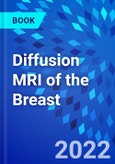-
Offers an in-depth discussion of DWI's clinical applications in breast imaging, including the position of DWI with respect to other modalities, the use of DWI in the diagnosis of suspicious lesions with a multiparametric protocol, the use of DWI as an imaging biomarker of prognosis and response prediction, the potential role of DWI for unenhanced breast MR screening, and more.�
-
Provides a basic introduction to DWI before discussing a practical approach to clinical interpretation and quality assurance issues.�
-
Covers specific challenges and advanced techniques (IVIM, non-Gaussian diffusion, DTI, and other novel techniques), radiomics and artificial intelligence, and different vendor approaches in breast DWI packages.�
-
Features more than 500 high-quality images throughout.�
-
Explains how DWI could be specifically used to provide information on prognosis and prediction factors.�
-
Evaluates the current status of DWI, its potential for the management of breast cancer patients, and possible future developments in the field.�
-
Enhanced eBook version included with purchase. Your enhanced eBook allows you to access all of the text, figures, and references from the book on a variety of devices.�
Table of Contents
Introduction
A- Basics of breast diffusion MRI
- General principles and challenges of diffusion MRI (Le Bihan, Iima, Partridge)
This section will provide the physical basis of Diffusion MRI, give the key concepts necessary to understand and use DWI in clinical practice
B- Breast Clinical Applications
- Overview of conventional breast imaging (MMG, US, MRI except DWI) (Mann and/or Kuhl)
This chapter will give a general overview of the field of breast imaging, with pros and cons, to help positioning DWI among all other approaches
- Overview of breast DWI: Diagnosis of suspicious lesions using DWI in combination with standard MRI (20 pages) (Baltzer, Clauser, Gilbert)
This chapter will review how DWI is currently used as a breast imaging modality and how breast lesions appear with DWI
- Biomarkers, prognosis and prediction factors (10 pages) (Iima, Moy)
This chapter will explain how DWI could be specifically used to provide information on prognosis and prediction factors (eg Her, Pg, ER, Ki67 receptors expression) and help lesion management
- Disease and treatment monitoring (10 pages) (Partridge, Hylton, Li)
This chapter will provide guidance on how DWI can be used to manage breast lesions, from diagnosis to treatment monitoring, using examples for most common types of lesions
- Diffusion MRI as a stand-alone unenhanced breast imaging approach and screening (10 pages) (Amornsiripanitch, Hee Jung Shin, Partridge)
This chapter will foresee how DWI could be used as a stand-alone approach (without DCE): patient population, technical requirement
- DWI and breast physiology status (menstrual cycle, pregnancy, lactation) (10 pages) (Iima, Nissan)
This chapter will review how changes in hormonal context and physiology may affect appearance of DWI normal breast tissues and lesions
C- Challenges and Advanced Techniques
- IVIM/perfusion Non-Gaussian diffusion (20 pages) (Sigmund, Iima, Le Bihan)
This chapter will show how tissue microcirculation (perfusion) can be obtained from DWI without the need for tracers or contrast agent, explain why boosting sensitivity to diffusion provides added contrast and information on tissue microstructure, and how to combine both approaches in a clinical setting
- DTI (20 pages) (Sigmund, Partridge)
This chapter will explain how Diffusion Tensor Imaging could potentially reveal oriented features in the breast (eg ducts) and how lesions might modify them
- Tissue characterization, radiomics, Artificial Intelligence, multiparametric imaging and integration of diffusion MRI to BIRADS (20 pages) (Pinker, Morris)
This chapter will explain how DWI could be combined to other advanced breast imaging approaches to provide higher sensitivity, specificity and prognosis
- Novel/Alternative Acquisition Techniques - (20 pages)
o DWIBS (Takahara)
o MS-EPI, RS-EPI, SMS, RSI, etc - (Hargreaves)
Those short chapters will provide glances at novel or alternative methods to perform DWI with specific focus for breast applications
D- Let us get practical
- Clinical interpretation of diffusion MRI, ROI assessment, common errors, pitfalls and artifacts, challenges in acquisition (20 pages) (Gilbert, Patterson)
This chapter will provide guidance on the interpretation of DWI in the breast, qualitatively and quantitatively, showing how common errors can be avoided and artifacts corrected
- Quality control, standardization, test-objects (20 pages) (Chenevert, Newitt, Malyarenko, Keenan)
This chapter will provide guidance on how to optimize DWI protocols, verify and control settings to obtain accurate and reproducible results








